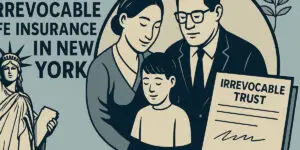Estate Planning for Vacation Homes in New York
Owning a vacation home can be one of the most rewarding investments. It provides a retreat for you and your family, a place to create memories, and an asset appreciated over time. However, managing vacation homes within an estate plan can present unique challenges. Proper planning is crucial to ensure your vacation home is protected, efficiently transferred to the next generation, and free from unnecessary tax burdens or legal issues.
At Morgan Legal Group in New York City, we specialize in estate planning for all types of properties, including vacation homes. With the complexities of New York State law, ensuring that your second home is incorporated into your estate plan requires careful attention to detail. Below, we outline the key considerations and steps you should take to secure your vacation home for future generations.
1. Include Your Vacation Home in Your Estate Plan
One of the first steps in protecting your vacation home is ensuring it is included in your estate plan. While many people take the time to draft a will or establish a trust for their primary residence, they may overlook adding their vacation home to the plan. Failing to include your vacation home can lead to probate delays, disputes among heirs, and even forced sales.
In New York, all real property, including vacation homes, must be properly addressed in your estate plan to avoid these complications. You should clearly state your intentions regarding the vacation home in your will or trust documents, whether you plan to leave the home to one or more beneficiaries or if you intend to sell it and distribute the proceeds among your heirs.
2. Assess the Financial Impact on Heirs
Owning a vacation home comes with ongoing expenses such as property taxes, maintenance, insurance, and utilities. When leaving a vacation home to heirs, it is important to consider whether they will have the financial means to cover these costs. If not, you may need to establish a financial plan that provides for these expenses.
One option is to establish a trust that includes provisions for funding the upkeep of the vacation home. This could involve setting aside money from your estate specifically for maintenance and taxes, or it may include income-generating assets that will help cover these expenses. Without proper planning, heirs may struggle with the financial burden of maintaining the property, which could result in the forced sale of the home.
3. Use a Trust to Avoid Probate
Transferring a vacation home through a will requires the property to go through probate, which can be a lengthy and costly process in New York. You may consider transferring your vacation home into a revocable living trust to avoid probate. A trust allows for a seamless transfer of ownership upon your passing without the need for court involvement.
By placing your vacation home in a trust, you can specify how and by whom the property will be managed. This is particularly important if you plan to leave the property to multiple heirs, as it can help avoid disputes about who is responsible for the home’s upkeep and usage.
4. Determine Shared Ownership Arrangements
If you plan to leave your vacation home to multiple heirs, such as children or grandchildren, it is important to define the terms of shared ownership clearly. Disputes can easily arise when multiple parties are involved, particularly if some heirs want to keep the home while others prefer to sell it.
In your estate plan, you should specify how the property will be used, maintained, and managed. For example, you may outline a schedule for when each heir can use the home or establish a management agreement that assigns specific responsibilities for property upkeep. Additionally, you can create provisions for what happens if one heir wants to sell their share while others want to keep the home.
5. Consider Tax Implications
Tax implications are a significant factor in estate planning for vacation homes. In New York, real estate taxes, capital gains taxes, and estate taxes can all impact the transfer of a vacation home to your heirs. Working with a knowledgeable estate planning attorney who can help you navigate these tax considerations and minimize the tax burden on your estate and your beneficiaries is important.
One strategy for reducing tax liabilities is gradually transferring ownership of the vacation home during your lifetime. This can be done through annual gifts of fractional interests in the property, taking advantage of the annual gift tax exclusion. By gifting portions of the property over time, you can reduce the overall value of your estate, potentially lowering estate tax liabilities.
6. Plan for Long-Term Management
Estate planning for vacation homes should also consider the long-term management of the property. If your heirs are not interested in managing the home themselves, you may want to appoint a property manager or establish a trust that designates a third party to oversee the home’s maintenance and use.
This can be especially useful if your vacation home is located far from where your heirs live, making it difficult for them to handle day-to-day responsibilities. A professional property manager can ensure the home is well-maintained, rented out if desired, and properly insured. By planning for long-term management, you can protect the property’s value and ensure it remains an asset for your family.
7. Communicate with Your Family
Open communication with your family is one of the most important aspects of estate planning for vacation homes. Discussing your intentions for the property with your heirs is crucial, including how you expect the home to be used and maintained. By involving your family in the planning process, you can reduce the likelihood of future disputes and ensure that everyone is on the same page.
Additionally, discussing your plans with your heirs allows them to voice any concerns or preferences they may have regarding the property. This can help you make informed decisions about structuring your estate plan to accommodate their needs while preserving your vacation home for future generations.
Conclusion
Estate planning for vacation homes requires careful thought and preparation. From avoiding probate to addressing tax implications and ensuring the property’s long-term care, many factors must be considered. At Morgan Legal Group, we specialize in creating comprehensive estate plans that protect your assets and ensure your wishes are honored. If you own a vacation home in New York, contact us today to discuss how we can help you incorporate it into your estate plan and secure its future for your family.









